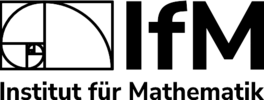Study Info
Why study maths?
The most important prerequisite is an interest in mathematical content, problems and considerations. In addition, the same is required as for any other degree programme: diligence, perseverance and a critical attitude, also towards yourself. However, there is probably no other degree programme where you have to learn as little by heart as in mathematics; here, understanding contexts and backgrounds is required.
Why study in Oldenburg?
The Institute of Mathematics in Oldenburg is characterised by a positive learning atmosphere and committed teaching staff. This is reflected in particular in the excellent relationship between students and lecturers. A special feature of the Oldenburg mathematics degree programme is the range of innovative courses that make it easier for you to start your studies.
The Institute of Mathematics has three main research focuses (Mathematical Structures: Theory and Applications, Mathematical Models in Economics and Natural Sciences, Mathematical Education Research and Teaching Development), each of which is supported by active, internationally successful research groups. The connection to current mathematical research also ensures that the programme content is continuously adapted and critically reviewed. In addition, the research groups offer the opportunity to come into contact with current research topics during the course of your studies (e.g. as part of your Bachelor's or Master's thesis).
Where can I get more information?
If you have any questions about studying mathematics, please contact the lecturers by email or during office hours (see list of persons), or find out who you should contact on the page Representatives of the Institute of Mathematics in study matters.
The Day of Mathematics, which is organised regularly at the Institute, offers a special opportunity to obtain information (see the calendar of events). It is also possible to organise information events on studying mathematics at schools. Prospective students can also find further information on the student body website.


